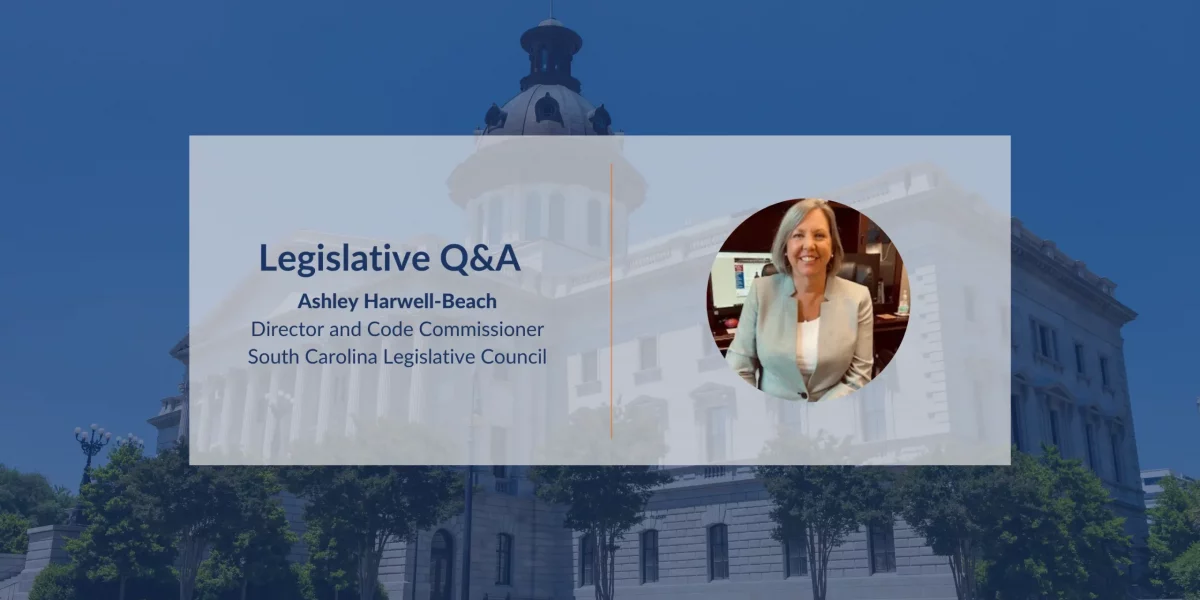At the heart of every legislature is the staff ensuring its smooth running. In this Legislative Q&A series, we’re talking to legislative experts and staff about their journey to the legislature, shining a light on the working lives at the heart of American law-making. In this interview, we speak with Ashley Harwell-Beach, Director and Code Commissioner at South Carolina Legislative Council. Ashley’s career path has taken her from a law clerk where she fell in love with the legislative process, to a stint working as Director of the South Carolina Sentencing Guidelines Commission. She tells us why South Carolina’s people are its biggest asset, what is on her radar for 2023, and why working for the legislature is one of the best legal jobs you can get.
1. Ashley, tell us a bit about your background. What was your first job? What was your first experience of the working world?
My first job in the legal field was as a law clerk for the Judiciary Committee of the South Carolina House of Representatives. I was a second year law student when I started this job. I fell in love with the legislative process and I enjoyed working directly with committee members on individual subcommittees.
2. What led you to work at the legislature initially? What was the draw for you?
3. How did you find the work? Was it different from what you imagined?
I found the work to be fascinating. I was much more involved with the legislative process than I imagined would have been the case early on and I enjoyed the subject matter. I went from the law clerk position to a stint as Director of the South Carolina Sentencing Guidelines Commission. There, I worked on sentencing guidelines, truth-in-sentencing, and crime classification legislation and conducted studies on prison and probation populations. From there, I returned to the House Judiciary Committee and served as Chief Counsel primarily working with criminal and constitutional law matters and drafting before joining the South Carolina Legislative Council and now serving as Director and Code Commissioner. The work is actually what I imagined it to be.
4. What did you enjoy most? What was your biggest learning in your first couple of years?
I enjoyed working with the different members the most and helping them shape state policy. The biggest learning experience in the beginning was probably just learning the rules of the chambers and how to pivot between the various drafting requests to accomplish what a member may want and maintaining neutrality, while at the same time providing the appropriate legal advice and guidance.
5. How has your role changed and progressed over time?
Starting out as a law clerk to a legislative committee, progressing to a leadership role there, then moving into my current leadership role with Legislative Council was a natural progression. However, in my current position with Legislative Council, we serve both bodies and so we have to be careful to protect the confidentiality of both bodies in the work that we do. We also serve as a neutral party in the middle when circumstances warrant, and our role often is to ensure that the intent of the bodies is carried out within the confines of our authority relating to the updating of the Code of Laws.
6. How has technology in the legislature evolved throughout your career?
We have kept up with the latest software releases, and of course moved from Word Perfect to Word. However, we have been wed to using Macros for drafting and other functions for a long time. The Macros have begun to break down and have caused many headaches over the past few years in particular. It is now the ideal time for us to rethink the way we draft and how we do so many things as we seek to best serve the needs of our General Assembly.
7. What is on your radar for 2023? What do you think are the biggest talking points of the year?
The biggest thing on our radar for 2023 is a whole new drafting system. We have been analyzing our drafting systems for the past two years and have engaged Propylon to redesign our systems. Next year’s biggest challenge will be rolling out the new drafting system, training all our drafters, and just getting over the hump of learning something new. We think the new system will be more intuitive and a vast improvement over old, outdated processes.
8. South Carolina is synonymous with its beautiful beaches. What is one thing that you love about your state?
9. If you could travel back in time and speak with your younger self, what advice would you give?
The best advice I would give my younger self would be to worry less and know that when you do your best, that is good enough.

